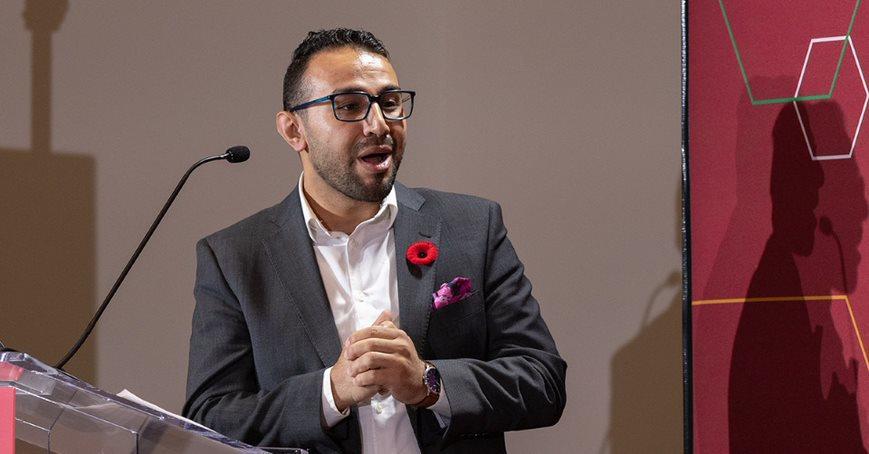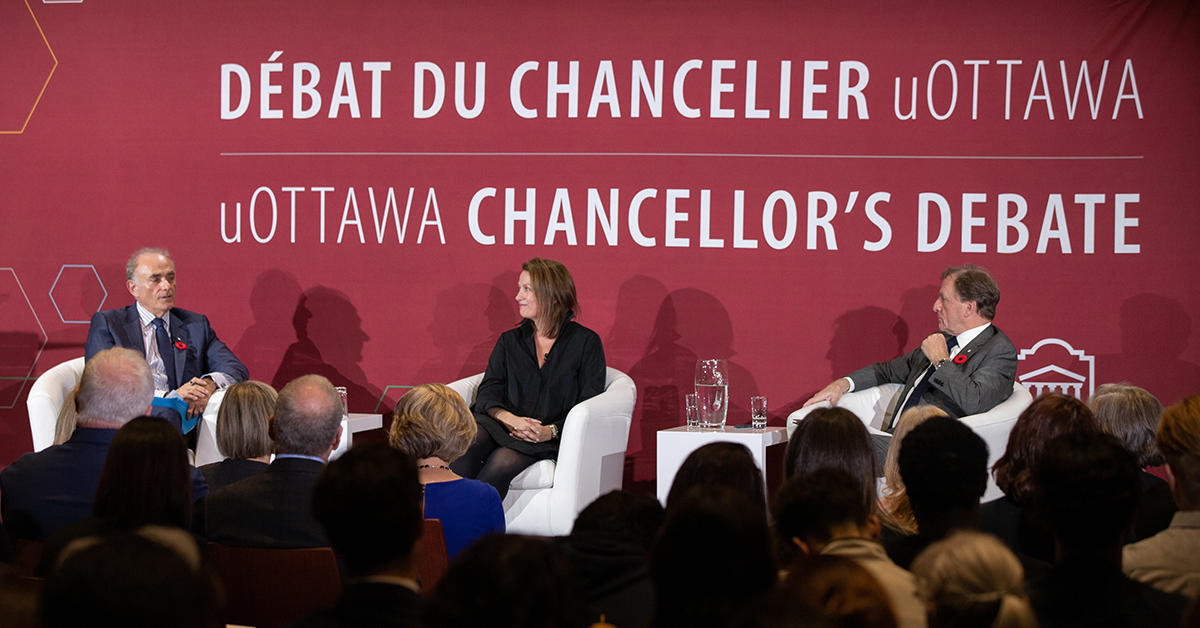
On November 3, outgoing uOttawa chancellor Calin Rovinescu hosted the last Chancellor’s Debate of his term, which highlighted the need for a global solution to the increasing problem of displaced people.
The debate featured a three-way dialogue that also included Allan Rock, uOttawa president emeritus and former Canadian ambassador to the UN, and Jennifer Bond, chair of the Global Refugee Sponsorship Initiative and managing director of the uOttawa Refugee Hub.
Rovinescu—once a refugee himself, arriving from Romania in 1961 with his parents—started things off by pointing out that there are now some 100 million forcibly displaced people in the world, many of whom may be displaced for 20 years or more, even for multiple generations.
Conversation topics ranged from the complex challenges of refugee resettlement to positive signs in the world’s response to solutions that deliver new ideas in today’s troubled geopolitical situation.
A made-in-Canada solution
Starting off on a positive note, Bond said Canada’s private sponsorship model—which allows Canadian citizens to resettle qualified individuals or families—can serve as an example for other countries. So many Canadians are keen to welcome newcomers that there is a waitlist.
There are heartening examples from other countries, too. Germany accepted more than a million refugees in 2015 alone. Households across Europe have accepted refugees fleeing Ukraine, and a special U.S. program for Venezuelan refugees announced in October filled up within days after so many Americans signed on.
Nonetheless, Bond is concerned that in today’s fractious political climate, public support for the concept of refugee protection is slipping.
Our fractured world
“After World War Two, there was an understanding of collective trauma and forced displacement, and the 1951 Convention (Relating to the Status of Refugees) had broad support,” Bond said. “I’m concerned that with the increased politicization and polarization around the world, millions of people no longer understand the need for refugee protection.”
Rock added that corrupt world leaders are worsening the situation, and that funding shortfalls are another serious issue. He pointed out that the United Nations High Commission for Refugees faces a significant funding gap, which is problematic for various reasons, including the fact that 80% of displaced people live in developing countries that struggle to serve their own populations.
The trio agreed that the climate crisis will compound the problem. For example, this year’s floods in Pakistan—caused by unusually heavy monsoon rains—displaced some 32 million people.
“Some small island states may completely disappear over the next 25 years” and displace millions more, Rock pointed out.
Reimagining solutions
Bond suggested that the immigration and settlement process has become “over-professionalized,” disempowering refugees and removing agency from hosts, but that there is plenty of room to reimagine it. New systems could draw on the “inherent goodness” in communities, inspire citizens to welcome newcomers and make use of new partners, such as the private sector.
“One way to engage the (private) sector is through labour pathways” that could reframe refugees as contributors rather than victims, she said. “We can acknowledge the incredible challenge, risk and heartbreak they endure without diminishing the skills, talents and passion they bring.”
Rabea Alriffai, a uOttawa alumnus who arrived from Syria in 2016 through the World University Service of Canada (WUSC) Student Refugee Program, likewise mentioned outdated perceptions of refugees as a problem.
Afriffai completed a master’s degree in education at uOttawa and works as a senior policy analyst for Global Affairs Canada. He spoke warmly about his reception on campus, but said it’s “not all roses” and that he has noticed that refugees can be perceived as “less.” He recommended finding ways to showcase how refugees contribute to society and ensuring they have a say in the policy decisions that affect them.
The WUSC uOttawa Local Committee is a student-run initiative. Now in its 40th year on campus, the committee is one the largest in Canada, and has sponsored 84 students over the past four decades.
Climate refugees and the UN Convention
Finally, from a legal perspective, Kristen Boon, dean of the Common Law Section at uOttawa, pointed out that the 1951 Convention doesn’t cover climate refugees.
The convention’s focus was civilians fleeing bombed-out cities, and it emphasized international cooperation as a response. Given projections that there will be 250 million displaced people by mid-century, due in part to the climate crisis—and given the fact that international cooperation may be doomed in today’s political climate—she asked whether the convention was still “fit for purpose.”
Rock’s take was that while the convention is showing its age, it would be difficult to negotiate it again, and it still has value. He favours developing a protocol that reflects modern challenges and could offer new solutions.
Rovinescu’s twice-yearly Chancellor’s Debates have brought thought leaders together since 2016 to explore important contemporary issues. When his term ends, Rovinescu will be succeeded by Claudette Commanda, who will be the first Indigenous and third woman chancellor in the school’s 174-year history.
